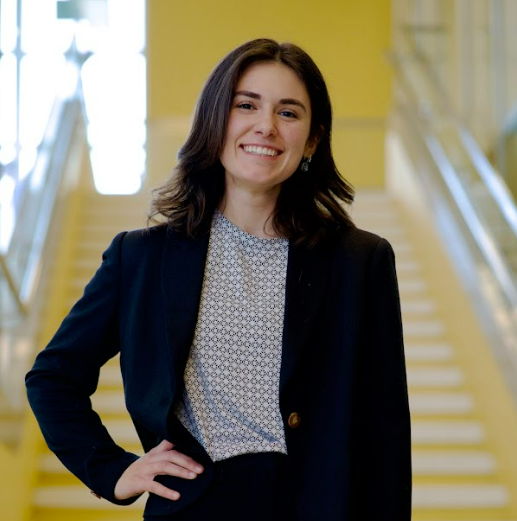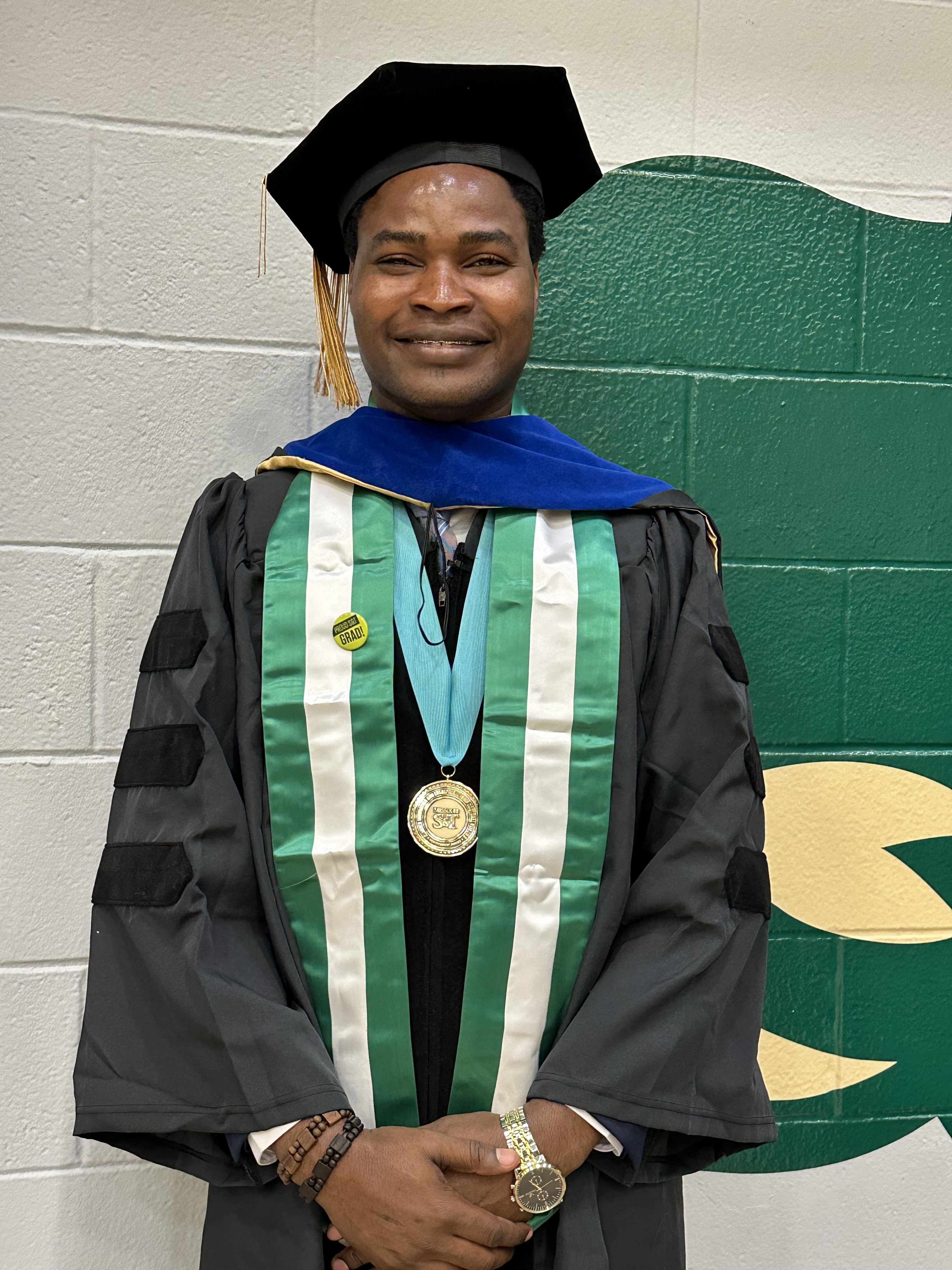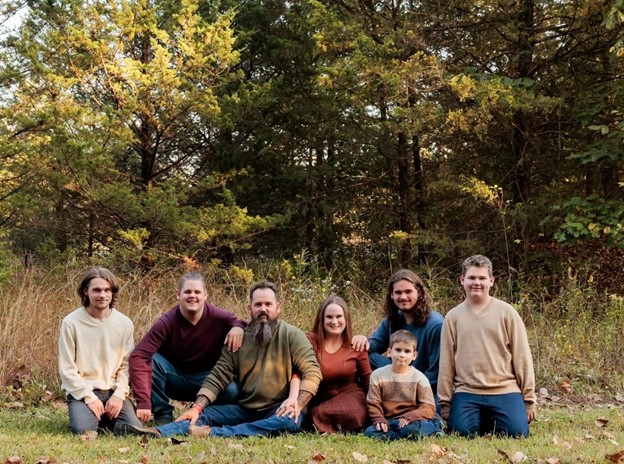Graduate Student Spotlights

Gracie Boyer
Mechanical Engineering PhD Candidate
We’re proud to highlight the incredible work and experiences of Gracie Boyer, a PhD candidate in Mechanical Engineering whose curiosity, creativity, and determination are fueling innovative research in energy storage systems. In 2024, she took First Place for Best Research Poster in the Graduate Research Showcase, hosted by our office.
Read on to learn more about what inspires her journey, how she stays balanced, and what she’s gained through graduate school—both personally and professionally.
1. What inspired you to pursue graduate studies, and why did you choose your particular program?
"I saw graduate studies as an opportunity to explore topics beyond what I studied in undergrad and to get hands on experience designing/conducting experiments. I chose my program specifically for the opportunity to learn about and design energy storage systems."
2. What impact do you hope your research will have, either in your field or in a broader context?
"With my research, I hope to inspire other researchers to explore unconventional methods for solving the energy challenges that we face both now and in the future."
3. How do you stay motivated and focused during long or challenging phases of your research?
"I try to surround myself with friends and family that encourage me to take breaks when I need them and provide motivation to continue when I feel discouraged or challenged."
4. What accomplishment are you most proud of during your academic career?
"I am most proud of the development of my skills in becoming an independent researcher. When I began undergraduate research, I often found myself unsure of which steps to take and constantly asking questions. Over time, I’ve gained the confidence to design and conduct experiments independently, while also recognizing when to seek input from others."
5. How do you balance the demands of graduate school with your personal life? Hobbies outside of school?
"I find having different hobbies such as music, pottery, cooking, and reading allows me to have various options to relax and unwind when I am feeling stressed from school/research."
6. What is something you’re most grateful for in your graduate school journey—whether it's a mentor, a specific experience, or an accomplishment?
"I am most grateful for the connections I have made in graduate school. The many friendships I made have given me support, companionship, and joy - things that have been greatly appreciated throughout my studies. Additionally, I am grateful for the professional relationships I have built. These have been a source of motivation and invaluable career advice."
7. What are you most excited about after you complete your graduate degree?
"I am really excited to have more time to spend with family/friends as well as the time and flexibility to work on my personal projects/hobbies."
We look forward to the impact she'll make in her field!

Ademola Adesokan
Computer Science PhD Graduate
We’re excited to spotlight Ademola Adesokan, a dedicated PhD graduate in Computer Science. His research focuses on using artificial intelligence to improve emergency response systems. He shares his motivations, accomplishments, and the impact he hopes his work will have.
1. What inspired you to pursue graduate studies, and why did you choose your particular program?
"What inspired me to pursue graduate studies was a deeply personal experience from my childhood—losing someone very dear to me to a stroke due to a delayed emergency response. That moment left a lasting impression on me and sparked a desire to use technology to improve critical care and emergency systems. This motivation and my passion for using computer science to address real-world challenges led me to pursue a Ph.D. at the Missouri University of Science and Technology. The program offered the perfect platform to explore how artificial intelligence can enhance disaster response and public safety. Supported by the Kummer Fellowship and a vibrant research community, I found the right environment to turn personal inspiration into impactful innovations."
2. What impact do you hope your research will have, either in your field or in a broader context?
"My research aims to significantly improve situation awareness in disaster management by leveraging machine learning and social media data. My work focuses on developing models to process real-time textual data from platforms like Twitter to detect and classify emergencies faster, helping first responders make informed decisions. The broader vision is to reduce response times, save lives, and help build more innovative, resilient emergency systems."
3. How do you stay motivated and focused during long or challenging phases of your research?
"I always remind myself of the real-world value behind my actions. When research becomes abstract or results are slow, I think about the communities that could benefit from improved emergency response systems. I also break significant problems into manageable parts and set short-term milestones. The support I have received from my advisor, Dr. Madria, and Kummer’s staff members has also been critical during challenging periods."
4. What accomplishment are you most proud of during your academic career?
"One of the accomplishments I am most proud of is becoming the first Ph.D. graduate of the Kummer Innovation and Entrepreneurship Doctoral Fellowship program at Missouri S&T. Earning my doctorate in just two and a half years, I published eight research papers and actively participated in the National Science Foundation’s I-Corps program, where I led the DisMEIRP project and conducted over 100 customer discovery interviews in six weeks. The project, which improved firefighter response times by 30 minutes, earned us the Spirit of I-Corps Award and national recognition—marking a decisive moment where my research directly translated into real-world impact."
5. How do you balance the demands of graduate school with your personal life? Hobbies outside of school?
"Balancing graduate school with my personal life requires intentional effort, and I have learned to create clear boundaries between work and rest. Outside of research, I enjoy exploring entrepreneurship and engaging in business activities, which keeps my creative side active. I also love reading about topics I am passionate about, playing and watching soccer, engaging in political discussions, and watching movies. Most importantly, spending quality time with family and friends helps me stay grounded and recharged. These hobbies offer relaxation and fuel my motivation and mental clarity."
6. What is something you’re most grateful for in your graduate school journey—whether it's a mentor, a specific experience, or an accomplishment?
"I am deeply grateful for the Kummer Fellowship program, which has shaped my academic and entrepreneurial journey. One experience that stands out is the semesterly site visits organized by the program—these visits to top companies allowed me to learn directly from industry leaders about their operations, challenges, and success stories, reigniting my passion for entrepreneurship. The fellowship also introduced me to a community of brilliant scholars with shared interests, fostering collaboration and inspiration. Moreover, of course, I am incredibly thankful for the mentorship of Dr. Sanjay Madria, whose guidance has been pivotal to my growth as both a researcher and a leader."
7. What are you most excited about after you complete your graduate degree?
"After completing my graduate degree, I am most excited to continue translating AI research into real-world impact, particularly in public safety, crisis response, and social good. I am passionate about using technology to solve meaningful problems, and I plan to pursue opportunities—whether in academia, industry, or both—that allow me to do just that. In addition, I am actively working toward securing funding to grow my startup, which focuses on developing scalable, AI-driven solutions for emergency response. I also look forward to mentoring the next generation of researchers as I have been mentored throughout my journey."
We're excited to see the places that Ademola will go!

Jennifer Harrell
Biological Sciences PhD Candidate
In our first graduate student spotlight, we’re excited to share Jennifer's journey, a dedicated PhD candidate in Biological Sciences. Jennifer is pursuing research in a field that combines the study of sleep and metabolic processes, with the goal of improving human health. Most recently, her research earned her the position of Runner-Up in the 2024 Three Minute Thesis competition. Here’s a look into what motivates her through the challenges and triumphs of graduate school.
1. What inspired you to pursue graduate studies, and why did you choose your particular program?
"I want to work in research, in industry. To do so in my field, one must really have an advanced degree to run a lab/project. I chose S&T because I love the small, family-like nature of our department. I felt I would gain enormous amounts of experience with biochemical techniques and also get real hands-on experience overcoming hurdles often seen in research. My advisor, Dr. Matt Thimgan, was also a big reason I chose to stay at S&T. His mentorship has really allowed me to grow in both confidence and skill, I couldn’t imagine being anywhere else."
2. What impact do you hope your research will have, either in your field or in a broader context?
"My research centers around sleep and metabolic processes. Inadequate sleep is linked with several disease states in humans. If I can identify a mechanism within those metabolic processes, then we can identify possible targets for intervention that would help others avoid adverse health outcomes."
3. How do you stay motivated and focused during long or challenging phases of your research?
"I stay motivated during the challenges by thinking about the people watching my journey, mainly my children. I can’t let them down. I want them to see that there are struggles, but if you want it and it’s your goal – you go over, around, under, and through any obstacle to achieve it. I also love the challenge of a puzzle, in research, there are endless puzzles to solve and questions to be answered. There is never a boring time in the lab."
4. What accomplishment are you most proud of during your academic career?
"I’m not sure if there’s just one thing that I’m proud of, but as I think on it - one thing does come to mind. As an undergraduate, I did research with Dr. Thimgan and Dr. Verble on wildland fire dispatchers. The data that I analyzed for that project laid the foundation and preliminary data for a $500,000 grant. I know the PIs did a lot of work to get that, but to have made a meaningful contribution to that process feels good. That undergraduate project resulted in a first author paper and conference presentation in Italy. It was a reminder that what we, as students, do matters."
5. How do you balance the demands of graduate school with your personal life? Hobbies outside of school?
"Being non-traditional, my personal life looks a little different than my peers. I am a mother of five boys, with two bonus children who have families and children of their own. My hobbies outside of academia are their hobbies; I have been a volunteer with Scouting America (formerly Boy Scouts of America) for almost ten years. My evenings and weekends are usually tied up with meetings, hiking, camping, staffing summer camps, etc. My schedule is always full – but it’s good. I wouldn’t be able to do it all without the love and support of my family – they are my rock."
6. What is something you’re most grateful for in your graduate school journey—whether it's a mentor, a specific experience, or an accomplishment?
"I am most grateful to my mentor, Dr. Thimgan. He’s been a tireless advocate in supporting my research goals and desires to learn new techniques. He always makes time for me to discuss my ideas and research. He poses questions that challenge me and teach me to develop my critical thinking and analytical skills – all very necessary to be a good research scientist."
7. What are you most excited about after you complete your graduate degree?
"This may seem silly, but I am most excited to tackle my 'to be read' pile of books. The PhD journey involves A LOT of reading, but academic reading."
We can’t wait to see where Jennifer’s research will go!

Follow Graduate Education